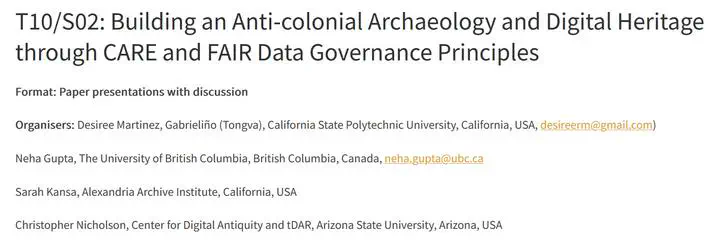Building an anti-colonial digital archaeology through CARE and FAIR data governance principles
 Image credit:
Image credit:Abstract
Growing availability of digital tools and technologies has the potential to facilitate anti-colonial methods in archaeological practice. The social context of archaeology, ownership of the past and the digitisation of heritage are major themes underlying how archaeologists collect, use, manage, interpret, share and circulate archaeological data in 21st century. From the 1960s onwards, Indigenous, Black and racialised groups, archaeologists and heritage scholars have highlighted power relations in terms of inequalities in access to strategic resources (material, social and ideological), ownership of, and control over cultural heritage, the protection and preservation of their ancestors and ancestral sites, and the authority to create narratives about their past. While fruitful, these efforts have typically obscured computing and digital tools in the practice of archaeology, underestimating the interweaving of power, space, technologies and knowledge making. In light of the United Nations Declaration on the Rights of Indigenous Peoples (2007), archaeologists and Western holding institutions are increasingly using global data governance principles, such as the CARE (Collective benefit, Authority to control, Responsibility, Ethics) and FAIR (Findability, Accessible, Interoperable, Reusable) in the collection, use, management, sharing and circulation of Indigenous data. Researchers concurrently use regional Indigenous data governance principles such as the OCAP® (Ownership, Control, Access, Possession), and the Maori Data Sovereignty Principles to shift power differentials, and restore decision-making about archaeology and digital heritage to Indigenous Peoples. This session invites presenters to showcase, share and discuss specific examples on how they are using Indigenous data governance principles to conceptualise, develop, and assert Indigenous rights to heritage data, and what challenges and barriers they have experienced in implementation. We especially encourage Tribal, Aboriginal, First Nation groups and scholars, early-career researchers and historically underrepresented scholars to contribute to the session.